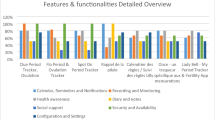Abstract
Contraception Mobile Personal Health Records (mPHRs) are efficient mobile health applications (apps) to increase awareness about fertility and contraception and to allow women to access, track, manage, and share their health data with healthcare providers. This paper aims to develop a requirements catalog, according to standards, guidelines, and relevant literature to e-health technology and psychology. The requirements covered by this catalog are Acceptability, Usability, Sustainability, and Internationalization (i18n). This catalog can be very useful for developing, evaluating, and auditing contraceptive apps, as well as helping stakeholders and developers identify potential requirements for their mPHRs to improve them.
Access this chapter
Tax calculation will be finalised at checkout
Purchases are for personal use only
Similar content being viewed by others
References
Sitruk-Ware, R., Nath, A., Mishell, D.R.: Contraception technology: past, present and future. In: Contraception, pp. 319–330. Elsevier, Amsterdam (2013)
Institute of Medicine: New Frontiers in Contraceptive Research. National Academies Press (2004). https://doi.org/10.17226/10905
Reyes, J., Washio, Y., Stringer, M., Teitelman, A.M.: Usability and acceptability of everhealthier women, a mobile application to enhance informed health choices. J. Obstet. Gynecol. Neonatal Nurs. 47, 853–861 (2018)
Malvey, D., Slovensky, D.J. (eds.): mHealth: Transforming Healthcare. Springer, Boston (2014). https://doi.org/10.1007/978-1-4899-7457-0
Fjeldsoe, B.S., Miller, Y.D., Marshall, A.L.: MobileMums: a randomized controlled trial of an sms-based physical activity intervention. Ann. Behav. Med. 39, 101–111 (2010). https://doi.org/10.1007/s12160-010-9170-z
Zhao, J., Freeman, B., Li, M.: Can mobile phone apps influence people’s health behavior change? Evid. Rev. (2016). https://doi.org/10.2196/jmir.5692
Kim, H.C.: Acceptability engineering: the study of user acceptance of innovative technologies. J. Appl. Res. Technol., 230–237 (2015). https://doi.org/10.1016/j.jart.2015.06.001
Bachiri, M., Idri, A., Redman, L.M., Fernandez-Aleman, J.L., Toval, A.: A requirements catalog of mobile personal health records for prenatal care. In: Misra, S., et al. (eds.) ICCSA 2019. LNCS, vol. 11622, pp. 483–495. Springer, Cham (2019). https://doi.org/10.1007/978-3-030-24305-0_36
Ochako, R., et al.: Barriers to modern contraceptive methods uptake among young women in kenya: a qualitative study global health. BMC Public Health 15, 1–9 (2015). https://doi.org/10.1186/s12889-015-1483-1
ISO, IEC, IEE: ISO/IEC/IEEE 29148: systems and software engineering—life cycle processes—requirements engineering (2011). https://doi.org/10.1109/IEEESTD.2011.6146379
Ouhbi, S., Idri, A., Aleman, J.L.F., Toval, A.: Evaluating software product quality: a systematic mapping study. In: Proceedings - 2014 Joint Conference of the International Workshop on Software Measurement, IWSM 2014 and The International Conference on Software Process and Product Measurement, Mensura 2014, pp. 141–151. Institute of Electrical and Electronics Engineers Inc. (2014). https://doi.org/10.1109/IWSM.Mensura.2014.30
Ouhbi, S., Idri, A., Fern, L.: Applying ISO/IEC 25010 on mobile personal health records. In: 8th International Conference on Health and Informatics, pp. 405–412 (2015)
Mistrik, I., Bahsoon, R., Eeles, P., Roshandel, R., Stal, M.: Relating system quality and software architecture (2014). https://doi.org/10.1016/C2013-0-00646-9
Ouhbi, S., Fernández-Alemán, J.L., Pozo, J.R., Bajta, M.E., Toval, A., Idri, A.: Compliance of blood donation apps with mobile OS usability guidelines. J. Med. Syst. 39(6), 1–21 (2015). https://doi.org/10.1007/s10916-015-0243-1
Okumus, B., Ali, F., Bilgihan, A., Ozturk, A.B.: Psychological factors influencing customers’ acceptance of smartphone diet apps when ordering food at restaurants. Int. J. Hosp. Manag., 67–77 (2018). https://doi.org/10.1016/j.ijhm.2018.01.001
Ouhbi, S., Fernández-Aleḿan, J.L., Idri, A., Toval, A., Pozo, J.R., Bajta, M.E.: A reusable requirements catalog for internationalized and sustainable blood donation apps. In: Proceedings of the 12th International Conference on Evaluation of Novel Approaches to Software Engineering, pp. 285–292 (2017). https://doi.org/10.5220/0006360202850292
Cruz Zapata, B., Fernández-Alemán, J.L., Toval, A., Idri, A.: Reusable software usability specifications for mHealth applications. J. Med. Syst. 42(3), 1–9 (2018). https://doi.org/10.1007/s10916-018-0902-0
Egarter, C., Grimm, C., Nouri, K., Ahrendt, H.J., Bitzer, J., Cermak, C.: Contraceptive counselling and factors affecting women’s contraceptive choices: results of the CHOICE study in Austria. Reprod. Biomed. Online, 692–697 (2012). https://doi.org/10.1016/j.rbmo.2011.12.003
Reiss, K., et al.: Using automated voice messages linked to telephone counselling to increase post-menstrual regulation contraceptive uptake and continuation in Bangladesh: study protocol for a randomised controlled trial. BMC Public Health, 1–10 (2017). https://doi.org/10.1186/s12889-017-4703-z
Koch, M.C., et al.: Improving usability and pregnancy rates of a fertility monitor by an additional mobile application: results of a retrospective efficacy study of Daysy and DaysyView app. Reprod. Health, 1–10 (2018). https://doi.org/10.1186/s12978-018-0479-6
McCarthy, O., et al.: A randomized controlled trial of an intervention delivered by mobile phone app instant messaging to increase the acceptability of effective contraception among young people in Tajikistan. Reprod. Health 15, 1–14 (2018)
Fruhauf, T., et al.: Measuring family planning quality and its link with contraceptive use in public facilities in Burkina Faso, Ethiopia, Kenya and Uganda. Health Policy Plan., 828–839 (2018). https://doi.org/10.1093/heapol/czy058
Hardon, A.: The development of contraceptive technologies: a feminist critique. Gend. Dev., 40–44 (1994). https://doi.org/10.1080/09682869308520010
Ouhbi, S., Fernández-Alemán, J.L., Carrillo-de-Gea, J.M., Toval, A., Idri, A.: E-health internationalization requirements for audit purposes. Comput. Methods Programs Biomed. 144, 49–60 (2017)
Plaete, J., De Bourdeaudhuij, I., Verloigne, M., Crombez, G.: Acceptability, feasibility and effectiveness of an eHealth behaviour intervention using self-regulation: “MyPlan”. Patient Educ. Couns. 98, 1617–1624 (2015). https://doi.org/10.1016/j.pec.2015.07.014
Acknowledgment
This work was conducted within the research project PEER 7-246 supported by the US Agency for International Development. The authors would like to thank the National Academy of Science, Engineering, and Medicine, and USAID for their support. Moreover, this research has been supported by the Spanish Ministry of Economy and Competitiveness and the European Fund for Regional Development (ERDF) under project RTI2018-098309-B-C33.
Author information
Authors and Affiliations
Corresponding author
Editor information
Editors and Affiliations
Rights and permissions
Copyright information
© 2020 Springer Nature Switzerland AG
About this paper
Cite this paper
Kharbouch, M., Idri, A., Redman, L., Alami, H., Fernández-Alemán, J.L., Toval, A. (2020). Software Requirement Catalog on Acceptability, Usability, Internationalization and Sustainability for Contraception mPHRs. In: Gervasi, O., et al. Computational Science and Its Applications – ICCSA 2020. ICCSA 2020. Lecture Notes in Computer Science(), vol 12252. Springer, Cham. https://doi.org/10.1007/978-3-030-58811-3_63
Download citation
DOI: https://doi.org/10.1007/978-3-030-58811-3_63
Published:
Publisher Name: Springer, Cham
Print ISBN: 978-3-030-58810-6
Online ISBN: 978-3-030-58811-3
eBook Packages: Computer ScienceComputer Science (R0)




